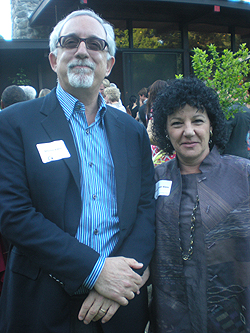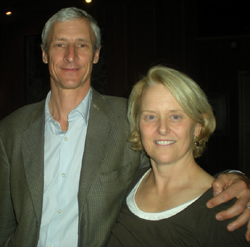Anyone who meets Freada Kapor Klein will quickly realize she puts the passion in compassion.
Freada sent her son to the top high school in the nation, Phillips Academy in Andover. When she discovered the school had filled its allotted seats for low income minority students to attend its outstanding summer program, MS2 (math, science squared), she decided to do something about it. Alongside her husband, Mitchell Kapor (Designer of Lotus 1-2-3), and her friends Christina Feeny and Cedric Brown (CEO, Mitchell Kapor Foundation), Freada set out on a mission eight years ago that resulted in the formation of the Level Playing Field Institute and the SMASH Academy (Summer Math and Science Honors).
Today, the SMASH program hosts 100 percent students of color and boasts 100 percent college acceptance. Additionally, 73 percent of students pursue STEM fields (science, technology, engineering and math). SMASH provides a blueprint that high schools and colleges across the nation can use to cultivate collaborative curricula that addresses the entrepreneurial and workforce needs of the 21st century Innovation Economy.
"I often get asked, 'Why do you do this?'" Freada said. "And I say, 'Why doesn't everyone do this?'"
STEM Education: Necessity or Luxury?
Unfortunately, in many public schools nationwide STEM education appears to be a luxury item -- priced at a level elusive even for high-achieving students who strive to overcome poverty-stricken socio-economic backgrounds. Currently, the knowledge-based, technology driven Innovation Economy is rapidly changing the workforce landscape, erasing opportunities for tens of millions of students trapped in poor performing public education institutions that seemingly perceive a STEM education as unaffordable and unachievable for the vast majority of student populations.
Oregon Schools
I was inspired by Freada and Christina when I met them both in the last week of April, the day after Oregon State Education Superintendent Susan Castillo announced a dismal 66 percent graduation rate for Oregon schools. Hidden within the overall data are alarmingly low graduation rates for Hispanics (55 percent) and Blacks (49.8 percent). One high-poverty school, Roosevelt High in Portland, eked out a catastrophic 36 percent graduation rate and a 45 percent dropout rate in 2010.
I wonder where are the Freadas and Christinas of Oregon?

Mitchell Kapor and Freada Kapor-Klein attend a fundraiser for the Level Playing Field Institute's SMASH Academy at the home of Curtis and Christina Feeny on April 27, 2011. SMASH offers free summer math and science education at UC Berkeley and Stanford University for low-income minority high school students.
SMASH Inspiration
I felt fortunate to stand among the small crowd of invited guests who gathered on a temperate spring evening in the shadow of Stanford University, at the forested home of Curtis and Christina Feeny, to pay homage to the achievements of seven exceptional SMASH students. The Feeney home was the origin of the effort to provide access to top teaching for top talented minority youth through the aptly named Level Playing Field Institute. It was the birthplace where Freada learned of the problem and decided to do something about it. Christina joined her that same day and the two moms became the "co-moms" of SMASH.
I have no doubt SMASH students will go on to make enormous impacts upon industries within their chosen pursuits. But I wonder if this program -- which eliminated the monetary barrier for hundreds of students -- will inspire a nationwide network that provides channels for hard-working, talented low-income students to access quality STEM education? Perhaps, if the worldview Freada holds can spread:
"My view of the world is it has great potential that it has nowhere near lived up to yet," Freada said. "All of our platitudes about fairness and meritocracy remain distant goals. People need to understand what great goals they are and how far away we are.
"We shouldn't be thanked for doing what we do. It should be a non-issue. These are incredibly talented, ambitious, wonderful kids. There shouldn't have to be anything special for them. They should be in institutions that recognize and reward their talents. And they're not. Our educational institutions aren't set up that way. Our workplaces aren't set up that way.
"We have yet to achieve the stated founding goals of this country. And I really want us to have renewed effort and vigor. Being a real meritocracy is hard work. Let's get on it!"
Moms Make a Difference
Freada and Christina are two Silicon Valley moms whose sons were blessed by their love and good fortune to receive the very best education in America. They also opened their hearts, homes and bank accounts to ensure hundreds of deserving students of color could receive the type of education that opens doors of access and success in the new Innovation Economy.

Curtis and Christina Feeny held a fundraiser for the SMASH Academy at their home on April 27, 2011.
Over the next several posts, I'll share more about some of these incredibly talented SMASH students and the challenges they face. I will also delve into the devastating education statistics, like the mere 1 percent of students in advanced math within high-poverty schools, that cry out for more proactive passionate moms (and dads) to join Freada and Christina in their quest to level the playing field by eliminating economic barriers to a quality education for low-income students.
Inspired by Freada
As I left Silicon Valley in my rearview mirror and drove back to southern Oregon, I thought about the dozens of concerned individuals who came to the Feeney home and eagerly contributed to the fundraising efforts that would help expand the SMASH program, which now brings deserving students across the nation to the campuses of UC Berkeley and Stanford University for five-week summer programs free of charge. I thought about the region where I live and wondered, 'What would happen if such a program existed at the local university?'
I could hear Freada's prophetic words that continue to remain with me to this day:
"Why doesn't everyone do this?"
